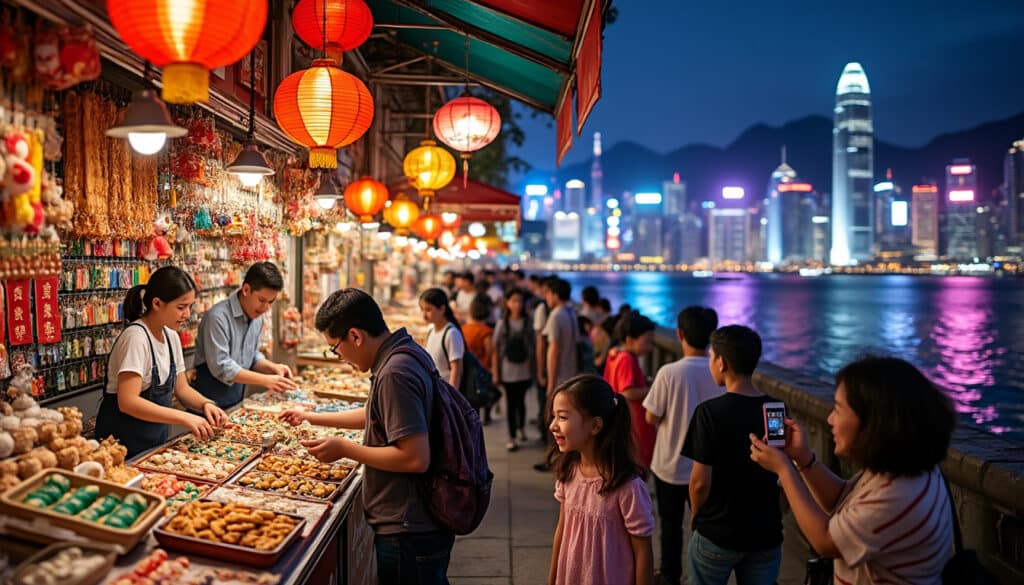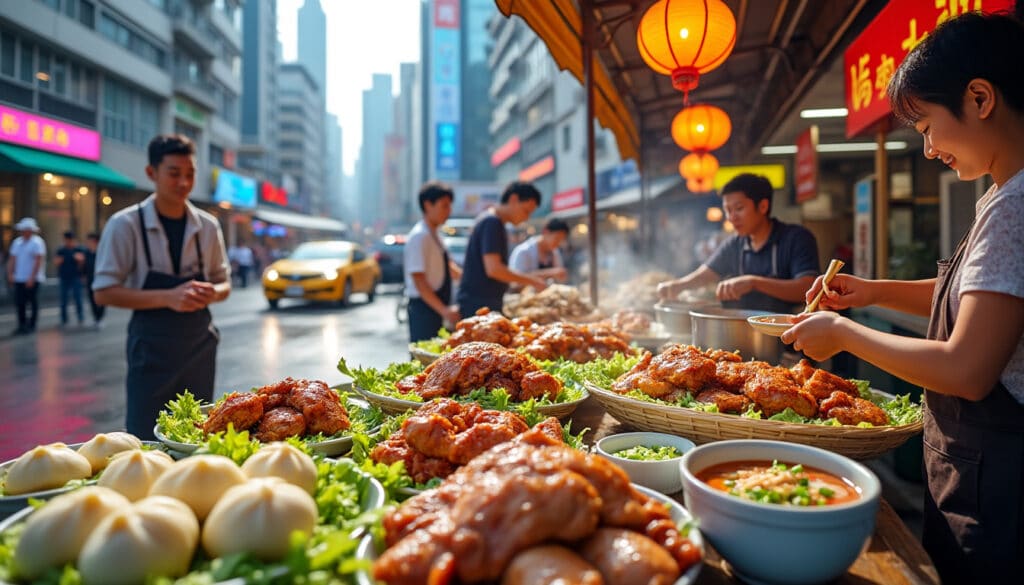Hong Kong, a city renowned for its vibrant culture and bustling life, is also a multilingual haven where diverse languages create a unique tapestry of communication. The city’s linguistic landscape, shaped by history and modern influences, is a reflection of its cultural heritage and global connections. From the widely spoken Cantonese to the prevalence of English, Mandarin, and other languages like Tagalog and Hakka, Hong Kong’s linguistic diversity is both complex and fascinating. This article delves into the rich variety of languages spoken in Hong Kong, exploring how this diversity impacts daily life, business, and cultural identity.
The Dominance of Cantonese in Hong Kong
Cantonese, a language that resonates deeply with the people of Hong Kong, holds a significant place in the city’s cultural and social fabric. This Southern Chinese dialect is not just a means of communication; it’s an embodiment of tradition and identity. As one explores the bustling streets of Hong Kong, the melodious tones of Cantonese are omnipresent, a testament to its dominance in daily life.
One might wonder, why is Cantonese so prevalent in Hong Kong? Historically, Cantonese has been the dominant language long before the city’s colonial era. Its unique system of nine tones sets it apart from other Chinese dialects, making it both challenging and captivating for non-native speakers. This tonal complexity adds a layer of expressiveness that is vividly portrayed in Cantonese operas and films, further embedding the language into the city’s cultural heart.
Despite pressures from the increasing prevalence of Mandarin, particularly in business and education, the Cantonese language remains deeply embedded in the local consciousness. The Hong Kong government’s stance on official languages supports this linguistic heritage by promoting Cantonese in the education system and public services, ensuring that future generations maintain this cultural lineage.
Key Reasons for Cantonese Dominance:
- Historical roots and cultural significance 🎭
- Government policies favoring its use in education and media 📚
- Cultural representation in arts and entertainment 🎥
The resilience of Cantonese is further demonstrated by its representation in everyday scenarios like public transportation announcements and local television broadcasts. This linguistic charm captivates not only locals but also tourists who may find themselves enchanted by the rhythm and warmth of Cantonese expressions.

Cantonese in Popular Culture
Popular culture is one of the most vivid arenas where Cantonese thrives. From airing on television to echoing through music and cinema, Cantonese language is an integral part of Hong Kong’s entertainment industry. Movies and dramas in Cantonese are renowned globally, often showcasing the rich cultural narratives of the region through its dynamic dialogues and emotional depth.
The prominence of Cantonese in music adds a lyrical beauty to its existence. Artists like Eason Chan have popularized Cantonese music beyond Hong Kong’s borders, making it an essential part of the global music scene. These cultural exports highlight how Cantonese continues to unite people through shared traditions and artistic expression.
The Role of English in Hong Kong’s Linguistic Landscape
In contrast to Cantonese’s cultural roots, English in Hong Kong symbolizes global engagement and modernity. As a legacy of British colonial influence, English has firmly established itself in the realms of business, education, and government. With approximately 46% of Hong Kong’s population having some proficiency in English, it serves as a crucial bridge to the international community.
The role of English in Hong Kong has evolved over time. Initially limited to official and educational settings, English has permeated daily life, driven by globalization and economic imperatives. The prevalence of bilingual education, where English is often used as a medium of instruction, prepares students for a world where communication across borders is vital.
Hong Kong’s cosmopolitan nature is reflected in its business language dynamics. English is the lingua franca in corporate settings, facilitating international trade and investment. This presence is not only confined to high-level business interactions but extends to everyday scenarios in multinational workplaces.
Importance of English in Hong Kong:
- Facilitates international trade and business 🌐
- Prepares students for global opportunities in education and careers 🎓
- Acts as a common language in diverse expatriate communities 🌏
Moreover, the widespread use of English in legal and government documents positions it as a vital language for governance and civic engagement. Laws and policies are often drafted and interpreted in English, ensuring clarity and uniformity in the city’s legislative processes.
English in Education and Media
The focus on English education is evident in both public and private schools, where English lessons are integral to the curriculum. Language centers and international schools proliferate, offering immersive English learning experiences for students seeking proficiency.
Media also plays a crucial role in maintaining the prominence of English. English newspapers, television channels, and online platforms provide news and entertainment, keeping residents connected to global narratives.
Mandarin and Its Rising Influence in Hong Kong
The rising number of Mandarin speakers in Hong Kong is a testament to its integral role in the city’s evolving linguistic landscape. As the official language of the People’s Republic of China, Mandarin—often referred to as Putonghua—has gained traction in business, education, and social interactions due to the increasing economic and political ties with mainland China.
While Cantonese remains the primary language for many natives, Mandarin has become a necessity in the cross-border business context. It is frequently used in corporate settings, especially those engaging with partners in mainland China. The rise of Mandarin classes in schools further cements its position as a second language for many Hong Kong residents.
Factors Contributing to Mandarin’s Growth:
- Increased economic ties with mainland China 💼
- Implementation in educational curricula 📘
- Usage in official and governmental settings 🏢
The integration of Mandarin into daily life is also evident in media consumption, where Mandarin dramas and news channels parallel Cantonese ones, providing a bilingual media landscape that caters to a diverse audience.
However, the growing use of Mandarin is not without controversy. Some local communities express concern over the erosion of Cantonese cultural identity, prompting dialogue on maintaining linguistic and cultural balance.
Learning Opportunities and Resources
Given the significance of Mandarin, there is a robust network of language schools and resources in Hong Kong aimed at language acquisition. Many universities offer in-depth Mandarin programs, while private language centers cater to all proficiency levels.
Online platforms and mobile apps are equally popular, providing flexible and accessible learning opportunities for busy residents. As a result, language learning in Hong Kong is a dynamic and evolving field, reflecting the city’s commitment to education and cultural preservation.
Other Languages: A Mosaic of Voices
Beyond the predominant languages, Hong Kong’s unique demographic composition has brought about a mosaic of other languages that contribute to its rich linguistic diversity. Among these are languages spoken by different ethnic communities and expatriates, each adding their distinct voice to the city’s soundscape.
Prevalent Minor Languages in Hong Kong:
- Tagalog: With a vibrant Filipino community, Tagalog is frequently heard in households and social spaces, reflecting the cultural exchange with the Philippines 🤝.
- Hakka: Historically significant, this Chinese dialect is still spoken by older generations, preserving regional heritages 🏡.
- Teochew, Hokkien, and Other Dialects: These languages exemplify the city’s historical connections with various Chinese regions, though their use is declining among the younger populace ⚖️.
- Malay and Tamil: Present within the communities hailing from Southeast Asia, these languages underpin Hong Kong’s international character 🎌.
The integration and preservation of these languages speak to Hong Kong’s identity as an international city, where multilingualism is embraced and celebrated. However, challenges exist as globalization and urbanization threaten these smaller language communities.
| Language | Significance | Community |
|---|---|---|
| Tagalog | Common in domestic settings | Filipino diaspora |
| Hakka | Preserves cultural heritage | Older Chinese generations |
| Teochew | Regional ties | Chaozhou community |
| Hokkien | Minor cultural influence | Southern Fujian expatriates |
| Malay | Migrant workforce | Southeast Asian workers |
Cultural Preservation Efforts
In response to the risk of language extinction, community organizations and cultural groups in Hong Kong are actively working to preserve and revitalize these lesser-spoken languages through cultural events, language classes, and media initiatives. This proactive approach ensures that Hong Kong remains a city where linguistic diversity is not only a feature but a celebrated aspect of its identity.
Challenges and Opportunities in a Multilingual Society
The linguistic diversity of Hong Kong presents both challenges and opportunities. While the coexistence of multiple languages enriches the cultural tapestry, it also creates potential communication barriers. For residents and visitors alike, navigating this multilingual city requires a keen adaptability and openness to different languages.
One of the most significant challenges is ensuring effective communication across languages, especially in situations requiring precision, such as healthcare and legal services. Despite the high proficiency in English and Cantonese among the population, language barriers can still pose difficulties, particularly for those less familiar with these prevalent tongues.
On the flip side, the diversity of languages serves as an incredible learning opportunity. With various language learning centers offering courses in languages like Cantonese, Mandarin, and more, Hong Kong is a fertile ground for language acquisition and practice. It fosters an environment where linguistic skills are seen as assets, enhancing both professional and personal opportunities.
Opportunities in Hong Kong’s Linguistic Landscape:
- Linguistic tourism attracting visitors to enjoy cultural exchanges 🏙️
- Language learning centers boosting language proficiency 📚
- Cross-cultural business ventures leveraging multilingual capabilities 💼
These opportunities highlight how a multilingual society can thrive, balancing the preservation of cultural identities with the benefits of global connectivity. As Hong Kong continues to evolve, maintaining this balance will be crucial to sustaining its linguistic and cultural vitality.
Technological Support in Communication
Technology plays a role in bridging language gaps, with translation apps and tools becoming increasingly sophisticated. These technologies not only assist in everyday communications but also support language learning efforts, providing interactive and intuitive platforms for users.
Embracing technological advancements alongside traditional language preservation methods ensures that Hong Kong remains a city where linguistic diversity thrives, providing a model for multicultural urban centers worldwide.
FAQ: Understanding Hong Kong’s Linguistic Landscape
What are the main languages spoken in Hong Kong?
Hong Kong primarily speaks Cantonese and English, with Mandarin also widely used due to economic ties with mainland China. Other languages such as Tagalog, Hakka, and Teochew contribute to the city’s linguistic diversity.
How can tourists navigate Hong Kong’s multilingual environment?
Tourists can navigate Hong Kong with ease as English is commonly used, especially in tourist areas. Learning a few basic Cantonese phrases can enhance the travel experience, allowing for deeper cultural engagement.
Are there resources available for learning Cantonese in Hong Kong?
Yes, Hong Kong offers numerous resources for learning Cantonese, including language schools, online courses, and community workshops. These resources cater to various learning preferences and proficiency levels.
Is English widely understood in Hong Kong?
English is widely understood and used, particularly in business and educational contexts. It remains a vital part of Hong Kong’s multilingual landscape, facilitating communication between locals and the international community.
What role does technology play in language learning in Hong Kong?
Technology supports language learning through mobile apps and online platforms that offer flexible and engaging ways to improve language skills, making language acquisition accessible to a broader audience.
Hong Kong’s linguistic diversity is a testament to its rich cultural heritage and global connections. By understanding the languages spoken, one gains deeper insights into the heart of this dynamic city.

Culture & Local Life in Hong Kong
Hong Kong, a city renowned for its vibrant cultural fusion, stands as a unique blend of Eastern and Western traditions. With its bustling streets and iconic skyline, Hong Kong offers a rich tapestry of local life that is both diverse…

Best places to eat in Hong Kong
Hong Kong, a powerhouse of culinary diversity, invites diners from around the globe to savor a fusion of Eastern and Western flavors. With its dynamic skyline, bustling streets, and a staggering number of over 18,000 restaurants, this urban gem offers…

When one thinks of Hong Kong, images of bustling streets filled with vibrant neon lights often come to mind. This mesmerizing city is not only known for its iconic skyline and thriving economy but also for its rich culinary culture…

Souvenirs and shopping in Hong Kong
Hong Kong, a city renowned for its bustling streets and vibrant culture, is equally famous for its shopping paradise. A blend of traditional markets and luxury malls, Hong Kong offers a unique shopping experience like no other. Whether you’re looking…

What do people eat in Hong Kong?
Hong Kong, often called the “Culinary Capital of Asia,” offers an incredible diversity of food that reflects its unique blend of Eastern and Western influences. With a rich history that dates back centuries, the city’s cuisine showcases a fusion of…


